Key takeaways:
- Emotional support in communities for those with cerebral palsy fosters connection and resilience, enhancing the journey through shared experiences.
- Psychoeducational groups promote self-awareness and personal growth by providing a safe space for open dialogue and resource-sharing.
- Active participation and vulnerability in these groups create deeper connections and encourage shared learning, leading to diverse and effective strategies for managing challenges.
- Implementing insights gained from group discussions into daily life, such as mindfulness practices and goal-setting, can significantly improve personal well-being.
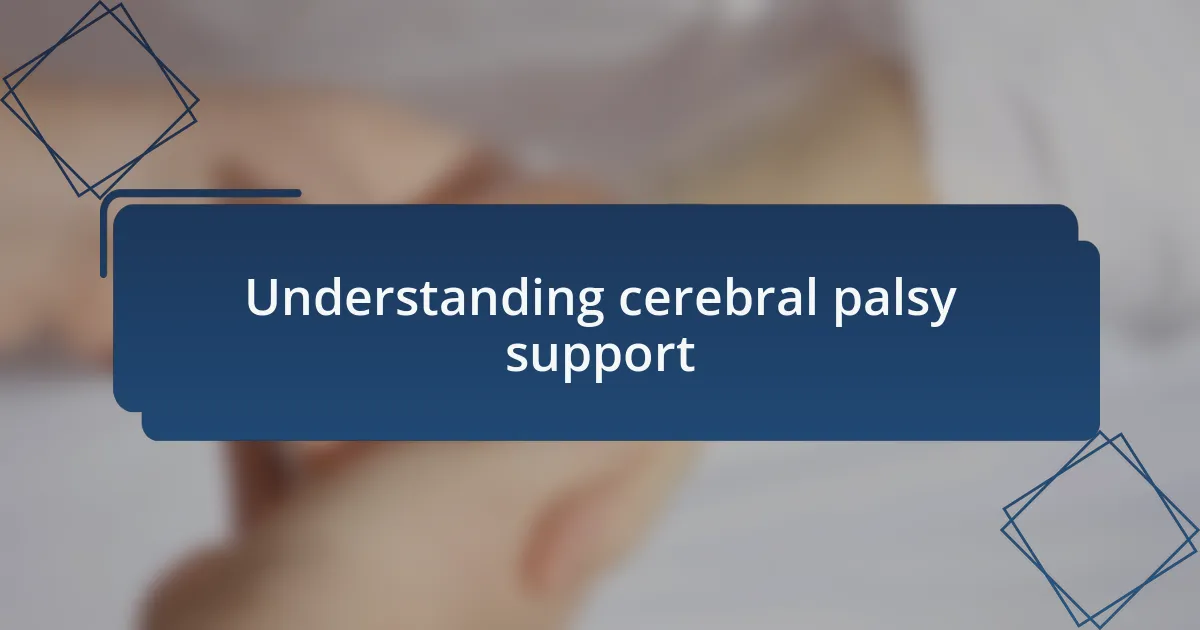
Understanding cerebral palsy support
Understanding cerebral palsy support goes far beyond simply providing physical assistance; it’s about fostering a sense of community and empowerment. In my experience, being part of a supportive group can make all the difference. The shared stories and struggles create bonds that help individuals feel less alone in their journey.
I remember attending meetings where parents openly discussed their fears and triumphs. Hearing someone express exactly what I was feeling was incredibly validating. This connection over shared experiences often led us to explore effective strategies for communication and mobility, enriching our understanding of what support truly means.
Have you ever wondered how emotional support impacts a person’s journey with cerebral palsy? It’s an essential layer that complements physical therapy and educational resources. I’ve seen firsthand how encouragement from peers can uplift someone facing daunting challenges, instilling hope and resilience that simply cannot be measured.
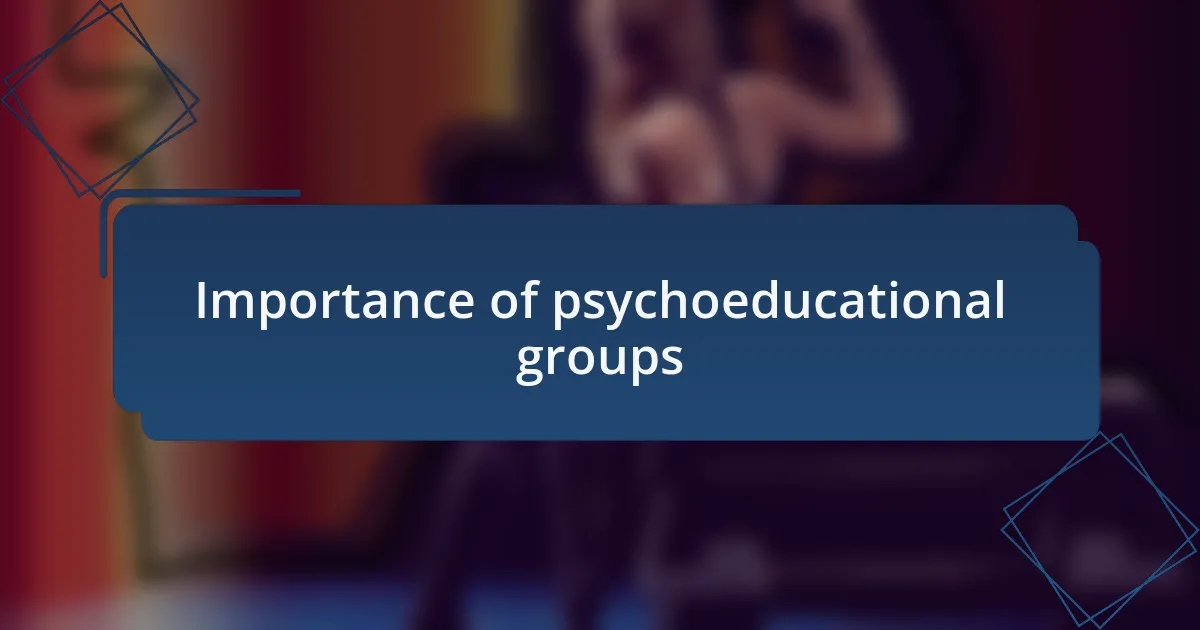
Importance of psychoeducational groups
Being involved in psychoeducational groups has profound importance, especially for those navigating the complexities of cerebral palsy. For me, it was a revelation to see how sharing experiences not only lightened my emotional load but also sparked new ideas and solutions among group members. This collaborative environment allowed us to explore our feelings and needs in a safe space, ultimately leading to greater self-awareness.
I still recall one particular discussion where we delved into the emotional challenges of raising a child with cerebral palsy. An open dialogue about fear, hope, and uncertainty made us realize that we were not alone in our struggles. This realization transformed our group into a sanctuary of support; it became a place where vulnerability was not just accepted but celebrated.
Psychoeducational groups also provide invaluable resources for learning and personal growth. Have you ever attended a workshop that completely shifted your perspective? I have, and it was in those sessions that I gained practical tools to improve communication strategies with my child. Such knowledge, gained from both professional facilitators and fellow participants, empowered us to make informed decisions and foster resilience in our family’s journey.
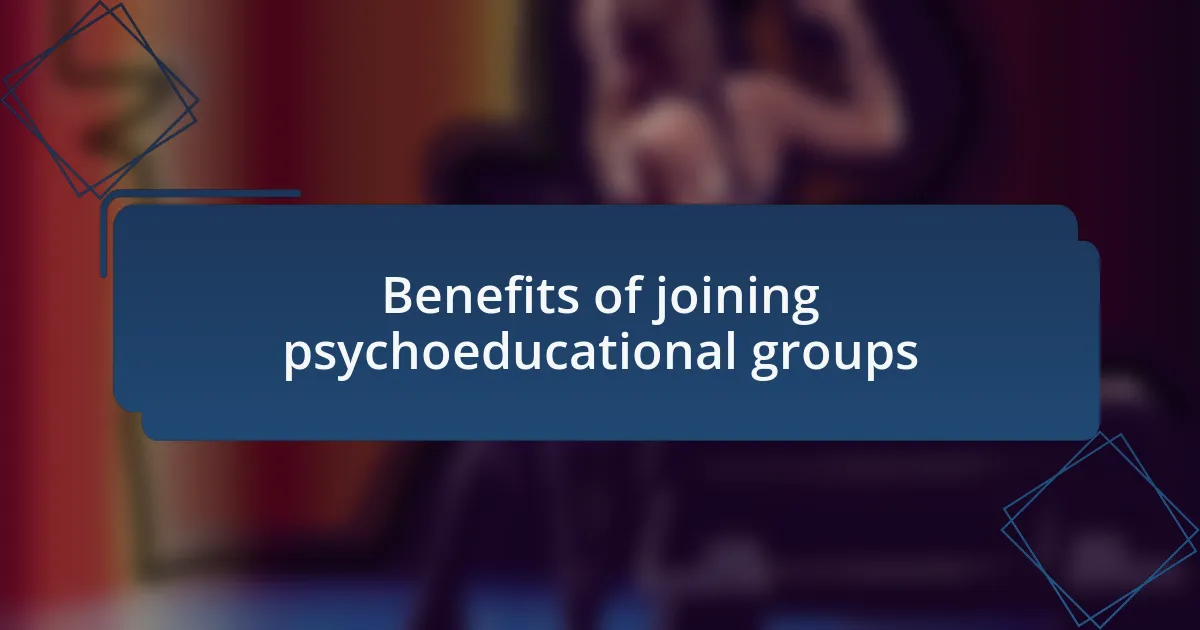
Benefits of joining psychoeducational groups
Joining psychoeducational groups offers a unique opportunity for connection and understanding. I remember the first time I felt truly understood by someone who shared similar experiences. It was during a group session when someone voiced a concern I had kept to myself for too long. That moment of connection reminded me how essential it is to be part of a community that validates your feelings and experiences.
The resources shared within these groups can be life-changing. I still utilize techniques I learned for managing stress and improving daily routines. For instance, after a session focused on adaptive strategies, I discovered simple changes in our home environment that made everyday tasks smoother for my child. It’s incredible how much can shift with the right guidance and support from your peers.
Moreover, the emotional resilience I built through these interactions is something I treasure. Have you ever felt alone in your challenges? I found that engaging in discussions about our fears and triumphs transformed my perspective on managing both my child’s needs and my own wellbeing. The shared stories not only uplifted me but also reminded me that together, we can navigate the peaks and valleys of this journey with hope and strength.
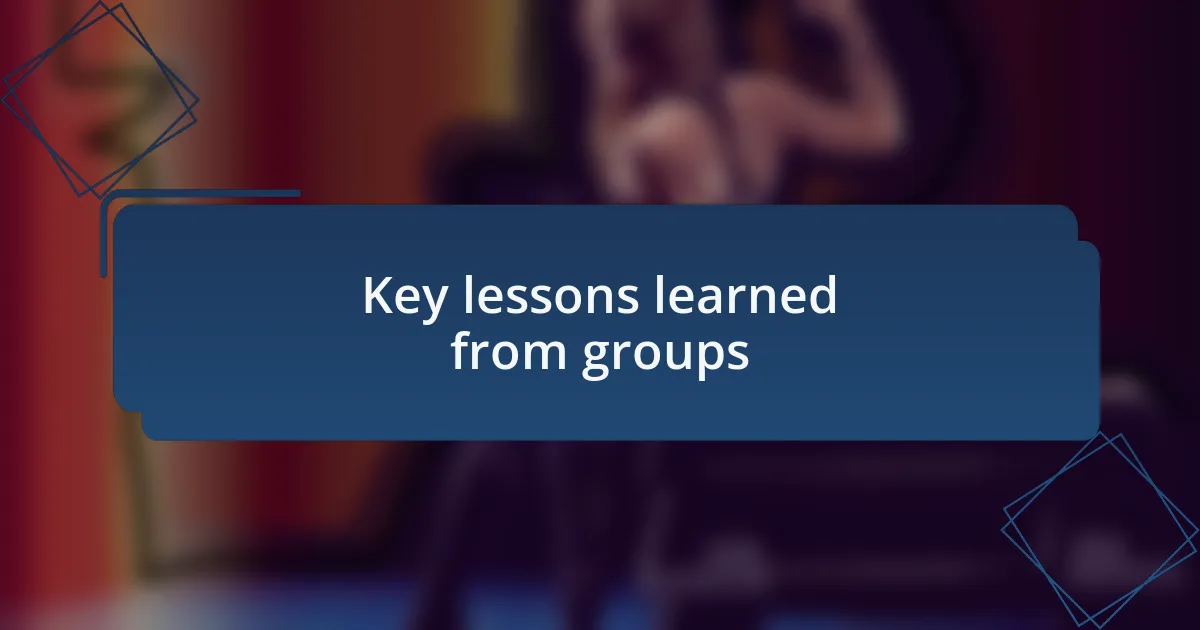
Key lessons learned from groups
Participating in psychoeducational groups taught me the power of vulnerability. I remember a moment when I shared my deepest fears about my child’s future; after I spoke, several others opened up as well. It was enlightening to realize we all carried similar worries, and in that shared vulnerability, we found a stronger bond and collective strength.
One key lesson was the significance of diverse perspectives. During one session, a parent shared a method that seemed unconventional but had incredible results for them. Initially skeptical, I tried it with my own child, and it led to unexpected progress. This experience reaffirmed my belief that there’s no one-size-fits-all approach; learning from others’ experiences can unveil paths I never considered.
Finally, I found that active participation not only empowered me but also fostered deeper connections with my peers. By listening actively and sharing my own insights, I noticed how encouraging it is to support others. Have you ever felt that rush of warmth when your words resonate with someone? That emotional exchange helped me realize that we can all be a source of hope and encouragement, showing how interconnected our journeys truly are.
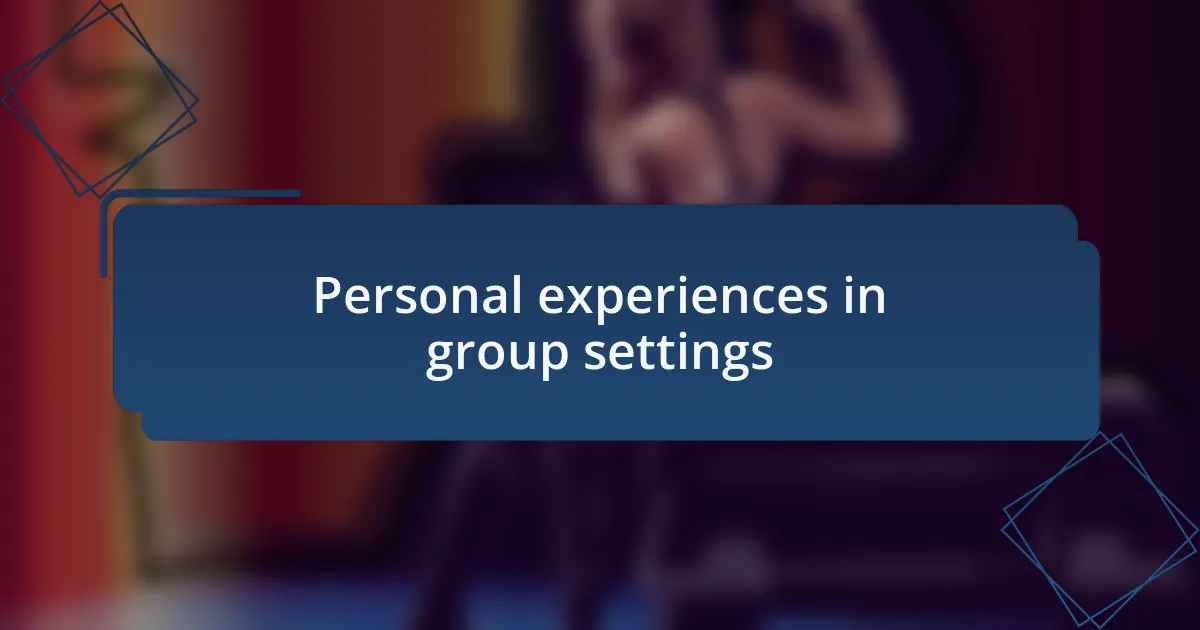
Personal experiences in group settings
In my experience, group settings can feel daunting at first, but the atmosphere fosters an unexpected openness. I vividly remember a session where we participated in a sharing circle. With each story shared about our challenges, I felt my own walls begin to crumble, realizing my struggles were more universal than I had thought. Have you ever sat in a room, listening to a story that struck a chord so deep it felt like the speaker was voicing your own inner thoughts?
Another standout moment for me was when a parent shared their journey of adapting communication techniques for their child with cerebral palsy. Their description of trial and error resonated with me, and it was a comforting reminder that we are all navigating the same turbulent waters, albeit in our own unique boats. Reflecting on their experience made me rethink my own approaches and reinforced the idea that collaboration often leads to new insights.
Through these shared experiences, I discovered how laughter can be a powerful tool in healing. During one session, a parent made a lighthearted joke about the chaos of managing therapy schedules. It sparked a ripple of laughter, and in that moment, the weight of our challenges felt just a little lighter. Have you found humor to be an ally in tough times? Sharing those lighter moments not only deepened our connections, but also reminded us that joy can coexist with hardship.
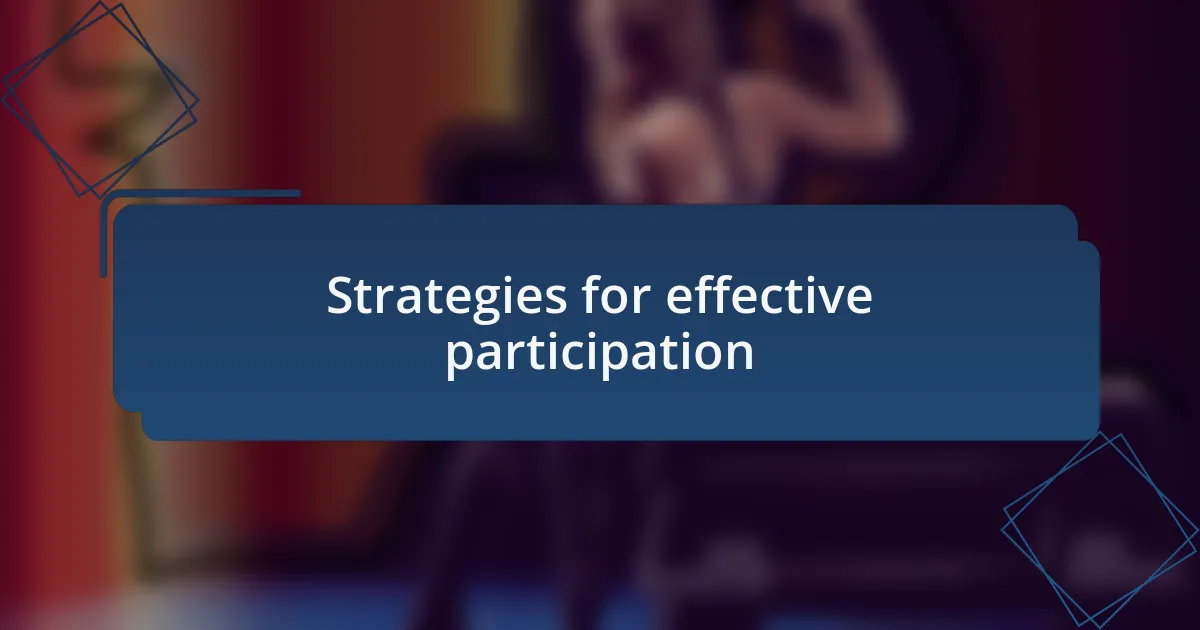
Strategies for effective participation
Creating an environment where everyone feels welcome to share their thoughts is crucial for effective participation in psychoeducational groups. I recall a session where we started with a simple icebreaker. It was fascinating to see how such a straightforward activity transformed the group dynamics, allowing even the quietest members to open up. Have you noticed how a little light conversation at the start can ease tension and encourage participation?
Active listening also plays a pivotal role. I remember feeling appreciated when a fellow participant truly listened to my perspective. In return, I made it a point to reflect on their experiences, fostering a mutual respect that enriched our discussions. It made me think: how often do we rush to respond without really understanding the other person’s viewpoint?
Additionally, setting goals for each session can significantly enhance engagement. One particular group decided to outline what we aimed to achieve that day, and it turned out to be enlightening. It gave each of us a sense of purpose and ownership over our contributions. Reflecting on this, I often wonder: how can focusing on clear objectives shape our interactions and outcomes?
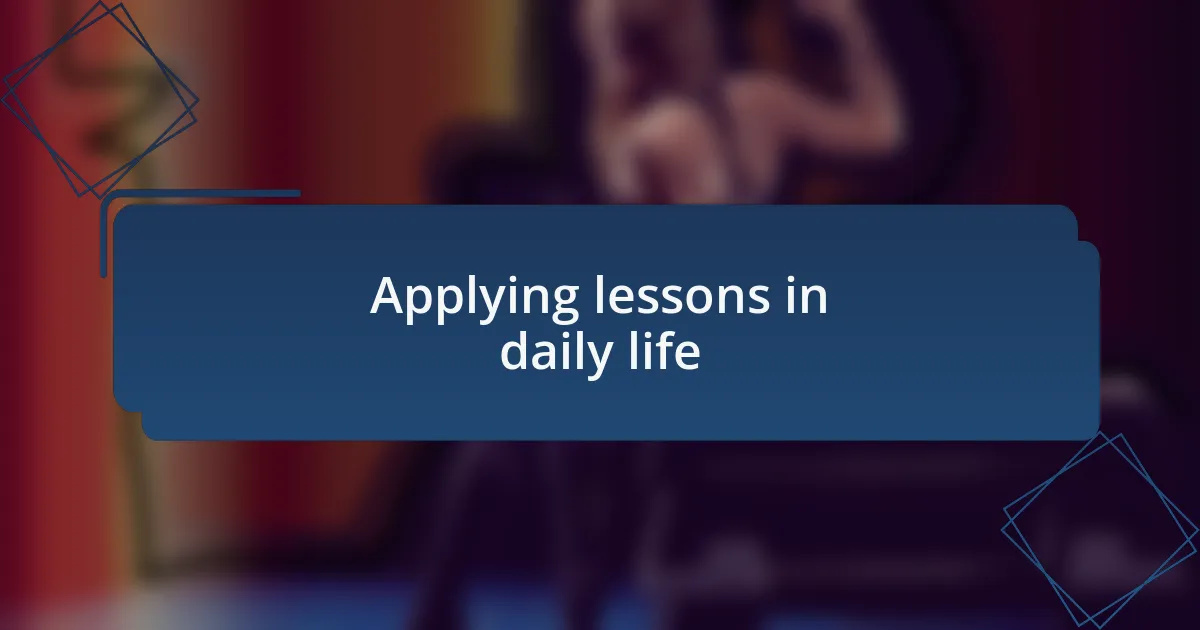
Applying lessons in daily life
Developing routines that integrate what I’ve learned from psychoeducational groups into daily life has been transformative. For instance, I began practicing mindfulness techniques discussed during our sessions to manage anxiety during challenging situations. It has not only grounded me in the moment but also improved my overall well-being; have you ever noticed how a few minutes of focused breathing can shift your entire perspective?
I also found that having open conversations with family about my experiences allows for deeper connections. One evening, I shared insights from a group discussion about coping strategies, and to my surprise, my brother offered his own tips. This exchange fostered a new level of understanding between us, making me reflect: how often have you found unexpected support from loved ones by simply opening up about what you’ve learned?
Moreover, I started to implement goal-setting techniques in my personal life. After realizing how powerful it was to have clear objectives in our group, I created a vision board at home to visualize my aspirations. Each morning, I take a moment to connect with those goals. It feels invigorating; doesn’t that sense of clarity and direction spark excitement for what’s to come?